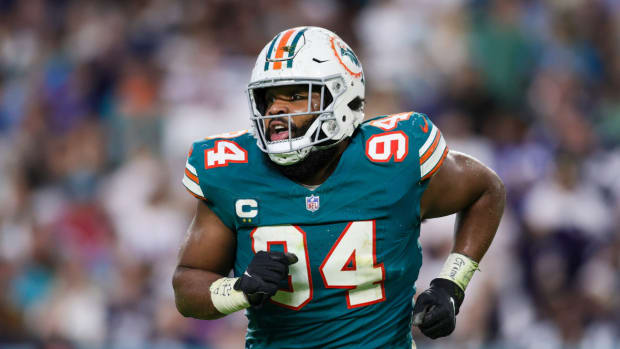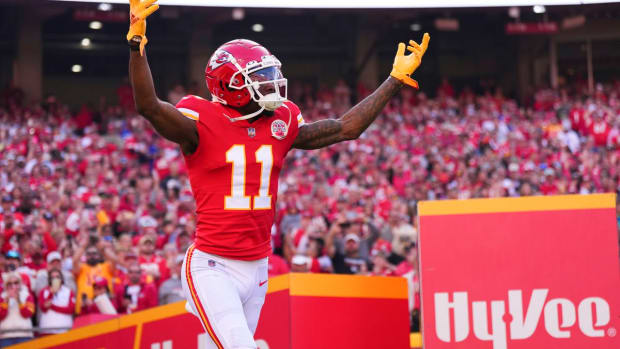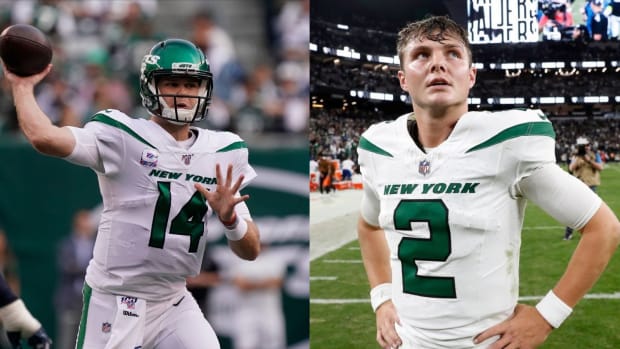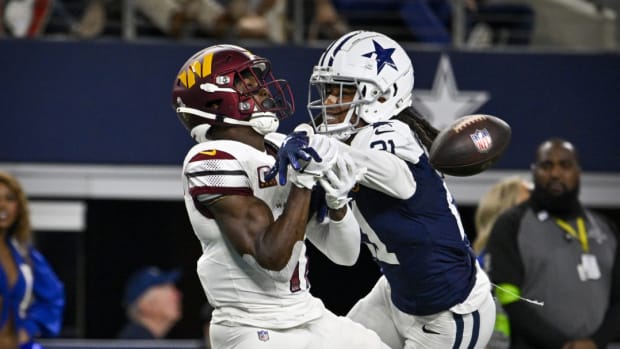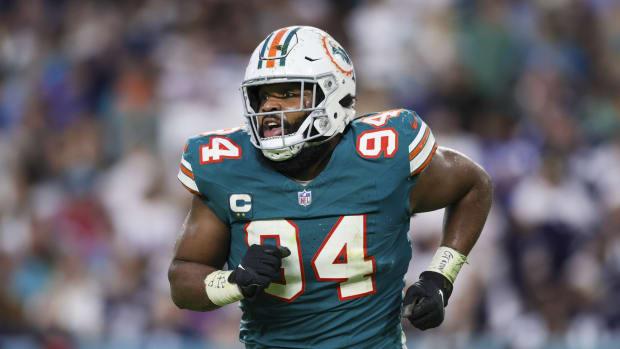
The N-Word: Two Views
The March 7 Monday Morning Quarterback column reported that the NFL’s competition committee was considering ways to legislate against the use of racially charged language on the field. Two of the The MMQB’s voices debate whether that’s a good idea—or if it’s even possible.
Peter King: As I wrote in my column this week, it’s unlikely the NFL is going to make use of the n-word a penalty this year, or any year in the near future. However, what has surprised me in recent days is not only to hear the voices of white sportswriters, like me, saying the word should be banned, but also hearing respected Hall of Fame football players, like Harry Carson and Marcus Allen, both of whom are African-American, say they oppose the use of the word too. Where I’m coming from basically is that it seems any word that has been so reviled for so long by so many African-American people can now be used in another form as a so-called term of endearment. I don’t get it.
Robert Klemko: It’s an extremely complicated issue, and there are valid arguments on both sides. I’m torn. It’s hard for me to justify the use of a word that has so much painful history, but I continue to use it in certain company. There’s a large portion of the American population, and an even larger portion of the NFL, that sees a big difference between the two variations of the word. Any time you’re trying to legislate change such as this, you have to approach it in a very intelligent and calculated way. A 15-yard penalty for the use of this word as opposed to any other vulgar word that gets dropped on a regular basis during games is the wrong way to go about solving this problem. Say we tell a young black man who grew up saying the n-word that he can no longer use it. Why aren’t we saying the same thing to guys who use terms like f----t and b----? Why are we targeted these guys? I think the n-word is awful, but it’s no more vulgar than calling someone a f-----t.
Hall of Famer Bill Willis was subjected to unambiguous racial epithets as a member of the Cleveland Browns in 1946. (Pro Football Hall of Fame/Wireimage.com)
PK: I don’t know. I'm not going to defend the use of any of those words. And I’m really on the fence whether this is fair to give somebody a 15-yard penalty for this. It’s just my feeling that this has no place, even if it’s used with “a” at the end instead of “-er”. The way I look at it, if you use the word that ends with “-a”, you’re basically fooling around with the n-word. I just find it hard to believe that people would use any form of it and say, “Oh, we were just kidding around.” I don’t think there really are parallel words, like if you call a woman the b-word or the c-word. With all due respect to women, the n-word almost stands alone in the American language today, in terms of how objectionable it is to one part of society.
RK: That’s your opinion, but you have to consider the majority opinion among young black players and young black people in general. A lot people grew up saying this and see absolutely no problem with it. So if you’re actually going to try to fix this problem—which I agree is a problem—you have to go the education route. You have to talk to players at the rookie symposium, and during training camp, and during seminars—the same way they’re going to talk to players about homophobic language when Michael Sam enters the league. You have to educate people, and you have to empower them. You have to address the symptoms behind the n-word. Do today’s players have enough of a historical perspective? Do they know what Harry Carson went through? From a selfish standpoint, guys need a better understanding of how the world views them when they say “nigga.” If they don’t think it’s a big deal to say, they probably don’t understand that most of the country reviles it. It’s about education and giving these guys perspective, because I don’t think that most young NFL players upon entering the league have had in-depth philosophical conversations with their friends about whether or not they should use the n-word. It seems obvious to us that nobody should, but I think you overestimate how introspective players are in terms of race and language.
PK: When this push started, it was just John Wooten and the Fritz Pollard Alliance. Harry Carson is 60. Wooten is 77. But this week there are more players, like D’Qwell Jackson, who said he thought overall it would be a good thing. Marcus Allen is He’s 53. I’d like to take a poll of players and ask them. I bet the majority of active African American players would say that it’s okay to use. And I think America really struggles and wonders why so many players think it’s okay, why they don’t understand that people like me, and even people of their own race, who are one generation older, are surprised by it.
RK: It’s a lot of factors. The word has changed in meaning so much for so many people, because we hear it in music—it’s in hip-hop music. You hear it in conversations with your family. Rarely does a black person use it in anger. I don’t think that I’ve ever heard a black person say pointedly, “You nigger.” I draw the parallel with young women who refer to their friends as “these b-----s” or “my b-----s.” That’s okay with them, and I’m sure there are people who hate that, but it doesn’t stir up the same kind of emotions as this n-word debate. I think it falls along the same lines, where black people feel they can refer to each other as “niggas” the same way that women refer to their friends as “b-----s,” but they would hate it if somebody from the outside—a man—called them that. It’s a privilege thing with some people, including me. Black Americans were undermined by that word for a long time, so now it’s somewhat enjoyable to a lot of people that we flipped it and made it exclusive, like being in a club. It’s going to be very difficult to take that away from young players. I think that it’s a lot of guys’ feeling that they don’t want the NFL—which is this majority-white governing body—telling them which words they can and can’t use when referring to one another.
You said you were on the fence about the penalty, so what do you think should happen?
Harry Carson would like this generation’s players to be more attuned to what their predecessors endured. (David Bergman/SI/The MMQB)
PK: I think what should happen is that Richard Sherman and maybe five or six significant player leaders, who are respected, who are bright guys, who believe that the word fine, should sit in a room with some both current and former players who think that it shouldn’t be used. These guys should be free to express their opinions and talk very openly
If I were the NFL, I would propose to basically do nothing this year other than say, “We’re going to continue to educate people on the matter.” Then at some point this spring—say May 30, a quiet day when no one is really expecting it—you gather these eight or ten people in a room and say, “Let’s talk about this.” That’s what I think should happen. What do you think should happen?
RK: I reached out to a player I have a lot of respect for and asked him that question. Israel Idonije, the Lions defensive end, is a guy who takes appearances seriously, as he’s making big strides as an entrepenuer in preparation for retirement from football. He was raised to never say the n-word, and he hates that black people use it. Here’s what he said: “One side of me says go ahead and implement the rule because it speaks to a psychological change that, culturally, we need. But this is not like penalizing the behavior that brings concussions. With the n-word you're talking about, somebody’s upbringing outside of the game. If you want to tackle those issues you need to address them outside of the game.” My idea is to bring in guys like Idonije and Ozzie Newsome and Jim Brown to give these guys perspective. It has to start with education, not just penalties, because otherwise players are going to feel like they’re being targeted, and they won’t respond well. It will take an education process that lasts a long time, in terms of either trying to convince these guys that it’s not a good word to use, or trying to convince them that for their own benefit they shouldn’t use it.
PK: Maybe the larger question that still remains as far as the NFL goes, is that at some point soon—probably very soon—there’s going to be a field mic, and on that field mic there’s going to be a player who says that word, loud. And that’s going to go into 19 million American living rooms. And then it’s going to be on all the highlight shows. And everybody will say, “Did you hear what was said on the Saints-Bears game?” Then everybody is going to say, “Well is that the affectionate use of the word, or is that the worst word in the English language?”
Look, I also speak from a point that I’m as white as they come. If I were a 56-year-old black man, I would probably think extremely similar to Harry Carson, who talks about the struggles of Bill Willis. There weren’t black players in pro football for a generation before Bill Willis and Marion Motley were signed to play with the Cleveland Browns in 1946. Willis and Motley heard the n-word in every stadium, and they were banned from playing in a game that year at Miami, in the deep South. Bill Willis is deceased, so he obviously can’t speak for himself, but it’s very hard for Harry Carson, who became friendly with Willis, to say, “That’s the ‘a’ version of the word. We’re just kidding around.” I just think there’s a large portion of the population—both white and black—that is going to say to people who think it’s okay: “Are you kidding me?” So those are the two things—the fact that it’s going to be picked up at some point very soon on a game mic, and that you’re never going convince former players, and not all-that-far-retired players, that this is okay.
Israel Idonije believes dialogue and education would change attitudes on both sides. (Tom DiPace/SI)
RK: What the younger players would tell the older players is that it’s an ownership thing. They feel like they own that newer variation of the word. And that there’s a lot bigger problems that the NFL should be dealing with, and they don’t feel like they’re being disrespectful in any way to the struggle that those guys went through. I think the great thing about our language is that words change. Maybe this works, and the word “nigga” is cut out of the English language. But I tend to believe that 50 years from now, most people will see them as two very different things. White people are growing up on hip-hop the same as black people. So while I don’t think it’s an appropriate word to use at this moment, I think it’s something that will evolve into being accepted rather than being reviled—as some of these older players and coaches want it to be.
PK: A lot of smart people I know believe that the word is fine to use in private company, so I think I can accept that. Is there any word that in private company among friends you think shouldn’t be used?
RK: I’ve been around gay guys who joke around and call each other “f-----s,” and women who call each other “b-----s.” It can become cathartic to take a word that has been used to oppress you and make it a joke. People on the outside might find it disrespectful, but I think it’s part of the healing process for a lot of people.
PK: Is this word something that can be extinguished in the black community? If you have a son, are you going to want him to use the word in any variation?
RK: I’m not going to encourage him to, but I wouldn’t mind if he did. What I was always careful about, and what all my friends are careful about, is saying it in front of people who don’t have “permission” to use it. A lot of players talk about how they use discretion when they use it in practice or the locker rooms because they don’t want to give white players a pass. Is that something constructive towards building a team? Probably not. I don’t necessarily want my children to use it, but I won’t mind if they do, because I believe they own it, in a sense.
It’s an issue that could be solved to an extent in the realm of football, where we do have these extremely diverse locker rooms where guys are forced to mix with different races and backgrounds and sexualities. If it’s something that’s stressed that needs to be changed, and there are enough older players who believe it, and enough younger players who are indifferent or malleable, the issue could be masked to the NFL’s satisfaction. It’s certainly going to remain in the locker room in the form of music, and I don’t think it’s something that can be fixed in black culture at large, because of the large numbers of people who accept a variation of the word and the huge number of people that will never have this conversation that we’re having right now.




































